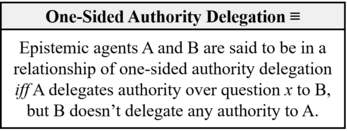One-sided Authority Delegation
What is one-sided authority delegation? How should it be defined?
In the scientonomic context, this term was first used by Nicholas Overgaard and Mirka Loiselle in 2016. The term is currently accepted by Scientonomy community.
In Scientonomy, the accepted definition of the term is:
- Epistemic agents A and B are said to be in a relationship of one-sided authority delegation iff A delegates authority over question x to B, but B doesn’t delegate any authority to A.
Contents
Scientonomic History
Acceptance Record of the Term
| Community | Accepted From | Acceptance Indicators | Still Accepted | Accepted Until | Rejection Indicators |
|---|---|---|---|---|---|
| Scientonomy | 7 September 2016 | The publication of the article by Overgaard and Loiselle titled Authority Delegation is a good indication of acceptance of the question. | Yes |
All Definitions
| Theory | Formulation | Formulated In |
|---|---|---|
| One-sided Authority Delegation (Overgaard-Loiselle-2016) | Communities A and B are said to be in a relationship of one-sided authority delegation iff community A delegates authority over topic x to community B, but community B doesn’t delegate any authority to community A. | 2016 |
| One-sided Authority Delegation (Patton-2019) | Epistemic agents A and B are said to be in a relationship of one-sided authority delegation iff A delegates authority over question x to B, but B doesn’t delegate any authority to A. | 2019 |
Accepted Definitions
| Community | Theory | Formulation | Accepted From | Accepted Until |
|---|---|---|---|---|
| Scientonomy | One-sided Authority Delegation (Overgaard-Loiselle-2016) | Communities A and B are said to be in a relationship of one-sided authority delegation iff community A delegates authority over topic x to community B, but community B doesn’t delegate any authority to community A. | 2 February 2018 | 6 February 2023 |
| Scientonomy | One-sided Authority Delegation (Patton-2019) | Epistemic agents A and B are said to be in a relationship of one-sided authority delegation iff A delegates authority over question x to B, but B doesn’t delegate any authority to A. | 6 February 2023 |
Suggested Modifications
| Modification | Community | Date Suggested | Summary | Date Assessed | Verdict | Verdict Rationale |
|---|---|---|---|---|---|---|
| Sciento-2016-0004 | Scientonomy | 7 September 2016 | Provided that the notion of authority delegation is accepted, accept the notions of mutual authority delegation and one-sided authority delegation as subtypes of authority delegation. | 2 February 2018 | Accepted | Following a period of discussion, it was finally agreed that "the current definitions of authority delegation, mutual authority delegation, and one-sided authority delegation, despite their problems, are currently the best available such definitions".c1 It was noted that these definitions don't take into the account the possibility of conditional authority delegation, where community A is prepared to accept the findings of another community on a certain topic only if these findings also satisfy some additional criteria imposed by community A. It was argued that there might be cases where a community's reliance on the findings of another community might be "conditional in ways that the current authority delegation definition is too restrictive to encompass".c2 The idea of conditional delegation was found pursuit-worhty.c3 It was also stressed that these definitions are only the first step towards a deeper understanding of the mechanism of authority delegation. Scientonomists were advised to pursue the idea of deducing "theorems concerning theory acceptance and method employment in delegating mosaics".c4 |
| Sciento-2019-0017 | Scientonomy | 26 December 2019 | Accept the definitions of authority delegation, and its subtypes, that generalize the currently accepted definitions to apply to all epistemic agents, rather than only communities. | 6 February 2023 | Accepted | The commentators found the modification uncontroversial.c1 c2 It was noted that the modification "merely attempts to capture what is already de facto accepted - namely, the idea that authority can be delegated by and to epistemic agents of all kinds (both communal and individual)" as indicated by the "fact that the canonical examples of authority delegation often involve individual experts (see, for example, Loiselle 2017)".c3 It was agreed that the modification "introduces a necessary rewording in the definitions of authority delegation and its species".c4 |
Current Definition
In Scientonomy, the accepted definition of the term is One-sided Authority Delegation (Patton-2019).
One-sided Authority Delegation (Patton-2019) states: "Epistemic agents A and B are said to be in a relationship of one-sided authority delegation iff A delegates authority over question x to B, but B doesn’t delegate any authority to A."
The definition tweaks the original definition of the term by Overgaard and Loiselle to ensure that the relationship of one-sided authority delegation can obtain between epistemic agents of all types. It also substitutes question for topic, as the former is the proper scientonomic term that should be used.
Ontology
Existence
In Scientonomy, it is currently accepted that "There is such a thing as one-sided authority delegation."
Subtypes
In Scientonomy, there are currently no accepted subtypes of One-sided Authority Delegation.
Supertypes
In Scientonomy, the following supertype of One-sided Authority Delegation is currently accepted:
If a question concerning the ontology of one-sided authority delegation is missing, please add it here.
Dynamics
If a question concerning the dynamics of one-sided authority delegation is missing, please add it here.
